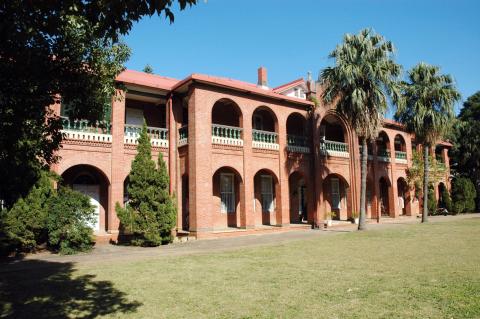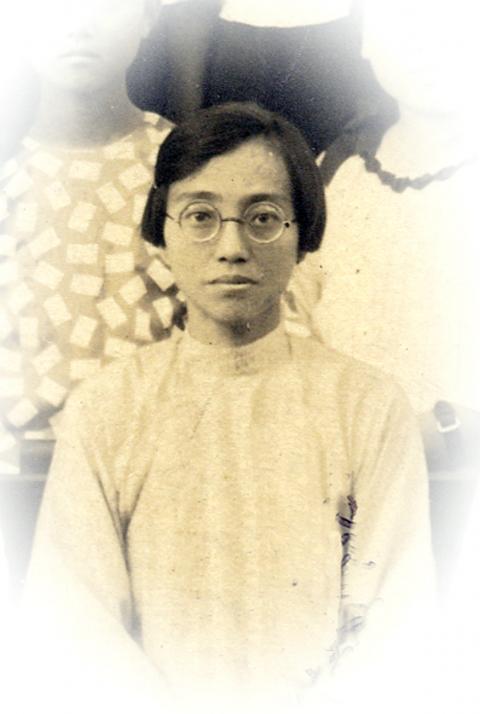Taiwan IN time: june 6 to june 12
For much of the latter half of 2005, many people in Taiwan waited eagerly in front of their television sets on weekday evenings as A Cinematic Journey (浪淘沙) came on, watching the dramatic life of Taiwan’s first female doctor unfold.
Based on the life of Tsai A-hsin (蔡阿信), the series was an adaptation of Tungfangpai’s (東方白, real name: Lin Wen-te 林文德), 1990 novel of the same name. It won a Golden Bell for best television series that year, and re-introduced Tsai to the public imagination half a century after she left for Canada.

Photos: Huang Chi-hao, Taipei Times
Tsai A-hsin also achieved many other firsts in Taiwan. Chu Chen-yi (朱貞一), an expert on Taiwanese medical history, writes in his biography of Tsai that she was also the first Taiwanese doctor to receive professional anesthesia training, participate in a medical residency and open a clinic in North America.
There are very few primary sources on Tsai. She wrote a biography in English but it was never published. Tungfangpai interviewed Tsai and obtained a copy for his novel, but Chu writes that he worked off an “incomplete” version. Chu also references the novel, while consulting with Tungfangpai which events were fiction and which were fact.
Chu noted that Tsai’s name was even missing from a list of Taiwanese who had studied abroad in Europe or North America.

Photo courtesy of Wikimedia Commons
“If it weren’t for Tungfangpai’s novel, [Tsai’s] legendary life would surely have been completely forgotten,” Chu writes. “One of the reasons is that she moved to Canada early, but the main reason is probably because of discrimination against women in Taiwanese society.”
MANY FIRSTS
Indeed, very few girls attended school during the time Tsai was born, either in 1896 or 1899.
In 1884, Canadian missionary George Leslie Mackay established the Tamsui Girls’ School (淡水女學堂), the first of its kind in Taiwan. Though tuition and housing were free, the school saw few students because of societal reservations, the majority of the students being Kavalan Aborigine converts.
Under Japanese rule, Tamsui Girls’ School became a six-year program for girls over the age of 12. Because the school still had trouble recruiting students, Tsai was admitted before she turned 12 as its youngest student.
Tsai’s maternal grandfather’s family was among the first Han Chinese to be baptized by Mackay, which probably contributed to their more liberal views on female education. Her mother also received some professional training as a midwife.
Chu says that Tsai was the only one in her class to master English. Since there were no high schools for women, Tsai went Japan at age 17 to study at a missionary school despite disapproval from her mother and neighbors.
Two years later, she was accepted to Tokyo Women’s Medical School (today’s Tokyo Women’s Medical University) as the only Taiwanese. When she attended a Taiwanese student gathering in Tokyo, she did not encounter another woman.
Historian Yu Chien-ming (游鑑明) writes in a study, Taiwan’s Professional Women during the Japanese Colonial Era (日據時代台灣的職業婦女), that it took a while for the next Taiwanese female medical student to appear in Japan — a dentist who graduated in 1926, five years after Tsai.
When Tsai took a semester off and returned to Taiwan to nurse her asthma, she achieved another first as, after many attempts, she persuaded the principal of an all-male medical school in Taiwan to let her sit in on classes, becoming the country’s first co-ed student at the higher education level.
She graduated in 1921 and returned to Taiwan and worked first as an opthamologist at a Taipei hospital and later as gynecologist. In 1924, she married Peng Hua-ying (彭華英), a notable political and social activist.
The family was frequently harassed by the authorities because of Peng’s activities, and even Tsai was suspected of being a Western spy due to her English proficiency and closeness with the church. Nevertheless, Tsai opened her own Ching Hsin Clinic (清信醫院) in Taichung in June 1926 as well as the Ching Hsin Midwife School (清信產婆學校), training about 60 students per year.
LIFE IN THE WEST
As Japan entered its military aggression period in the 1930s, the number of students dropped as people were afraid that their daughters would be sent to the battlefield because of their medical knowledge. Tsai closed her clinic and school and headed to North America in 1940, spending time at Harvard Medical School and later enrolling at the University of Toronto.
Tsai became stranded abroad due to the Japanese attack on Pearl Harbor. During this time, she received more medical training, including anesthesia, and worked at various hospitals as well as a Japanese POW camp. Here, she also ran into problems with authorities due to her Japanese citizenship, and even spent time in jail after being wrongly accused of operating without a license.
Finally, she returned in 1946 to a very different homeland. After the 228 Incident, her desire to leave Taiwan was solidified. In 1953, she left with her new husband, a pastor surnamed Gibson, and settled in Canada. Her desire to learn never ceased — even at almost 60 years old, she headed south to study at Columbia University’s School of Public Health.
Taiwan in Time, a column about Taiwan’s history that is published every Sunday, spotlights important or interesting events around the nation that have anniversaries this week.

Dissident artist Ai Weiwei’s (艾未未) famous return to the People’s Republic of China (PRC) has been overshadowed by the astonishing news of the latest arrests of senior military figures for “corruption,” but it is an interesting piece of news in its own right, though more for what Ai does not understand than for what he does. Ai simply lacks the reflective understanding that the loneliness and isolation he imagines are “European” are simply the joys of life as an expat. That goes both ways: “I love Taiwan!” say many still wet-behind-the-ears expats here, not realizing what they love is being an

Every now and then, even hardcore hikers like to sleep in, leave the heavy gear at home and just enjoy a relaxed half-day stroll in the mountains: no cold, no steep uphills, no pressure to walk a certain distance in a day. In the winter, the mild climate and lower elevations of the forests in Taiwan’s far south offer a number of easy escapes like this. A prime example is the river above Mudan Reservoir (牡丹水庫): with shallow water, gentle current, abundant wildlife and a complete lack of tourists, this walk is accessible to nearly everyone but still feels quite remote.

It’s a bold filmmaking choice to have a countdown clock on the screen for most of your movie. In the best-case scenario for a movie like Mercy, in which a Los Angeles detective has to prove his innocence to an artificial intelligence judge within said time limit, it heightens the tension. Who hasn’t gotten sweaty palms in, say, a Mission: Impossible movie when the bomb is ticking down and Tom Cruise still hasn’t cleared the building? Why not just extend it for the duration? Perhaps in a better movie it might have worked. Sadly in Mercy, it’s an ever-present reminder of just

Google unveiled an artificial intelligence tool Wednesday that its scientists said would help unravel the mysteries of the human genome — and could one day lead to new treatments for diseases. The deep learning model AlphaGenome was hailed by outside researchers as a “breakthrough” that would let scientists study and even simulate the roots of difficult-to-treat genetic diseases. While the first complete map of the human genome in 2003 “gave us the book of life, reading it remained a challenge,” Pushmeet Kohli, vice president of research at Google DeepMind, told journalists. “We have the text,” he said, which is a sequence of